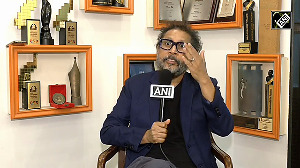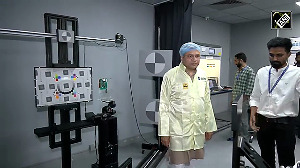Rakesh Sharma isn't taking any chances. He's watching every move made by his employees on closed-circuit televisions installed in his office.
He's constantly keeping an eye on the screens and the aim, he says, is to watch how his 'employees' conduct themselves with his 'clients'.
Says Sharma: "For a business model to be perfect there can be no room for mistakes."
This might sound like standard business practice in the watch-every-move 21st century. But Sharma's Pink Elephant in Delhi's Friends Colony isn't a run-of-the-mill corporate office.
It's a two-year-old play school and Sharma's 'clients' are its 100 under-five students. The 'employees' are the teachers racing from one toddler to another.
But in one way, Pink Elephant is a business like any other. It's a partnership between Sharma who used to run a software company in Singapore, and his friends -- Kiran Malhotra, a nutrition consultant at Stanford University, Kamala Menon, an educationist and entrepreneur Neerja Sharma.
Together they've invested Rs 60 lakh (Rs 6 million) in the playschool but it has been well worth it. The school is already raking in a crore annually.
Now its promoters are looking at expanding the chain in satellite towns like Gurgaon and Greater Noida.
"Our second branch should be operational by April next year while the third will also follow soon," he explains.
In the second phase, after three years, they'll look at handing out the schools to franchisees.
"The idea," chips in Neerja Sharma, who looks after the day-to-day activities of the school, "is to first create a brand and then branch out in a big way."
If the Sharmas and their partners are moving quickly there's good reason. There are heaps of opportunities in the business of teaching tiny tots -- but the competition in the classroom is also building up before you can say ABC.
Take Sudha Gupta who opened a pre-school seven years ago for the best of reasons -- she couldn't find a good pre-school for her infant son.
Gupta followed words with action and sank Rs 25 lakh (Rs 2.5 million) into starting a school, which offered everything that she, as a mother, was looking for.
Financially, she couldn't have done better. In the first year the school turned in a Rs 600,000 profit.
Today she has opened three branches of her Mother's Pride chain and turnover has zoomed to Rs 8 crore (Rs 80 million). In five years she reckons it will climb to around Rs 25 crore (Rs 250 million).
Forget about blackboard and chalk and the rundown school buildings that most of us remember from our childhood.
These new pre-schools are everything that the modern-day child could hope for. They have brightly coloured interiors with soft toys strewn about for good measure to create the right atmosphere.
One group of schools even has castle-shaped exteriors to give it the right fairy tale feel.
Look at Shemrock, one of the older players in this business, which started nearly 14 years ago with an investment of Rs 400,000.
The chain was the brainchild of Bimla Arora, a nutritionist by profession who started modestly in a tiny building with 20 students.
Today she has more branches than she had students in her first classes. The chain has 51 branches and a turnover of over Rs 20 crore (Rs 200 million).
"To be honest I was nervous and kept speculating whether I'd taken the right decision to start a pre-school."
Shemrock is moving one step further. It has just invested Rs 2 crore (Rs 20 million) to open the CBSE-affiliated Shemrock Senior Secondary school in West Delhi. But she won't be slowing down on pre-schools. On the anvil are about 10 more in the next two years.
How can a school expand so quickly? Arora's business plan involves bringing her whole family including husband, son and daughter-in-law into the business of teaching toddlers and ensuring that it's a viable business.
Her son, Amol Arora has moved into the pre-school business armed with an MBA degree from the University of California. He has become the organisation's director, business development and is being run off his feet by potential franchisees.
Amazingly enough the inquiries are pouring in not only from India but also from abroad. This includes queries from places as far afield as Malaysia, Dubai and London. Says Amol: "I'm very busy meeting people who've shown interest in our educational model."
Inevitably, this is a business dominated by first- time entrepreneurs who've realised they are on to a good thing and gone for growth. But there are international players who've spotted that education for tiny tots can be a big business.
Take Egmont International, a $2 billion Danish company that specialises in children's publications. Egmont's publications are used in all its schools and form the basis for standardising the education in extra-quick time.
Egmont entered the education business in 2001 but it has already shown that it is a quick learner. It has opened 35 Euro Kids pre-nursery schools and it has even reached to small towns like Sikar in Rajasthan.
By 2005 it would like to open around 300 schools in all corners of the country and it's even planning to have franchisees in places as far apart as the North-East, Orissa and Tamil Nadu.
"Our content is our strength. A child sitting in Sikar district, Rajasthan is exposed to the same educational toys and tools as a child sitting in Euro Kids Mumbai," says Rubbal Datta, manager, Euro Kids (North).
Similarly, Best Entertainment -- a Rs 50 crore (Rs 500 million) group, with interests in automotive components and international trading -- announced a joint venture with US-based Magellan Academy to kickstart its pre-school project with The Banyan in south Delhi.
Says Nitesh Jain, CEO, Best Entertainment, "Our foreign partner will provide us with technical inputs which includes lesson plans, teaching aids and training manuals for the staff." Best Entertainment will look at expanding The Banyan into a chain of 50 play schools by 2007.
But in the playschool business it's the smaller players who are making the running. In Mumbai, Lina Ashar is using slightly different techniques to spread her reach across the country.
Like many of the others Ashar, who has an education degree from Victoria University, Melbourne, started her preparatory school in a small apartment in Mumbai's Bandra district in 1994.
In the last decade Ashar has franchised her Kangaroo Kids pre-school chain and a second group of schools called Gymbaroo. She oversees 14 centres in 10 cities. Three more schools are scheduled to open this year. How does she expand quickly?
Many of the new franchised schools are run by former parents who've been impressed by her teaching methods and business skills. Again, Ashar is looking at upward expansion. She will be opening the first Billabong High School in 2004.
With so much business potential most of the schools are also trying innovative methods to keep in step with the rising competition.
Euro Kids, for instance, has introduced a cartoon character called Buddy to lure and teach children -- there are Buddy posters, Buddy furniture and even a wall that's painted with Buddy celebrating with friends.
Similarly, Mother's Pride has an in-house copywriter and an in-house research and design team. Gupta says she spends anywhere between Rs 50 lakh (Rs 5 million) and Rs 60 lakh (Rs 6 million) on printing brochures, calendars and gifts besides also taking out advertisements in leading newspapers.
But even if they started small, many of the new educationists are earning recognition in the profession.
At Mother's Pride, Gupta will soon be starting a teacher's exchange programme with Kids Wonderland, an established chain of play-group schools in Singapore.
What's more, Gupta wants to open about five new branches in the next three years. Once that's done successfully she'll start hunting for franchisees.
So far she has had a large number of requests but is treading carefully about franchising. She says anyone who wants to franchise will have to be ready to invest Rs 12 lakh (Rs 1.2 million) and provide about 1,000 sq ft of land for the school.
"As a parent I know what people expect from a good preparatory school. That's exactly why I'm moving ahead with my plans very cautiously," she says, adding, "I've worked very hard to create a brand name for my pre-school."
Don't get the impression that making money from pre-schools is easier than keeping pindrop silence in a class of five-year-olds. Yes, middle-class parents are prepared to fork out huge sums to ensure a good education for their children. But they are also becoming extremely demanding.
So the schools offer youngsters everything from skating rinks to splash pools and mini-auditoriums where two-year-olds can test their talents. Also, teacher-students ratios are in the region of 1:10. The monthly fees for all this can be anywhere between Rs 1,500 to Rs 3,000.
Keeping up standards can also be tough. To keep a tab on the quality control and teaching methodology, preparatory schools have content editors who work painstakingly on the course, the method and the module of teaching.
At Ashar's Gymbaroo Kids, the idea is that children enjoy learning through play, hands-on activities and interaction. So they are taught through activities, story-telling, songs and games.
Equal attention is paid to activities, which reinforce skills like balance, eye-hand coordination and rhythm.
At Stamford Children's World, another Delhi-based preparatory school there are no blackboards and everything is taught either by toys, story-telling, puppets and sometimes even clay-modelling.
However, at the same time even two year olds are introduced to the world of computers.
Inevitably, these modern teaching methods are backed by the latest technology, which is rapidly making its way into the classroom.
In one school the child's report card comes along with a digital photograph and an audio recording of the student interacting with the teacher.
Schools like Shemrock also have orientation programmes where leading psychologists and principals of prestigious schools are invited to interact with parents. Euro Kids on the other hand has tied up with Apollo Clinics and other doctors for quarterly check-ups of their students in most of its school branches.
"The parents of a two-year-old child are definitely interested in the look of the school besides, of course, the teaching methodology," says Deepika Goyal who has started a flourishing business importing the Popcorn brand of children furniture from Thailand.
Goyal, who is an MBA in international marketing, says that 80 per cent of her furniture is supplied to pre-nursery schools.
"According to my calculations the business of preparatory schools is growing at a rate of 8 per cent to 10 per cent per annum," says Goyal who is supplying her range of furniture to nearly 25 schools.
On every child, she says, schools are spending nearly Rs 2,500 to Rs 3,000 on furniture and educational tools.
For Goyal the boom in the preparatory schools has obviously translated into good business. She expects to make a profit of Rs 5 crore (Rs 50 million) within the next three years and plans to extend her furniture range.
Obviously, the pre-school business has plenty of room for growth as parents scout for better educational opportunities for their children.
But, behind the colourful classrooms it's hard work to get the teaching formula right -- and it's certainly not child's play.






 © 2025
© 2025